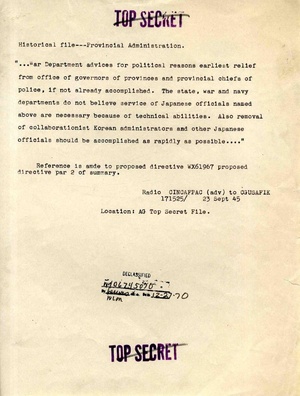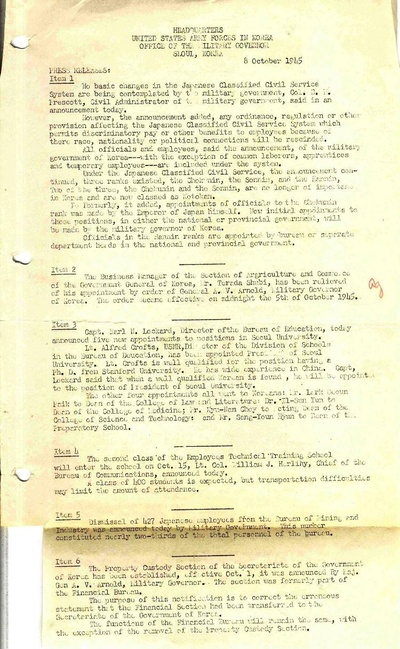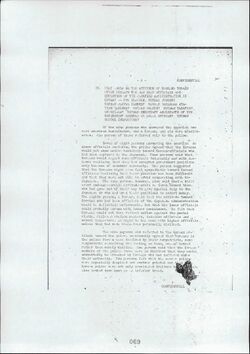태평양 전쟁 말기부터 미군은 해방 후 한국인들 사이에 친일파 논란이 벌어질 것을 예상하고 이에 대한 전문가들의 의견을 수렴하고 있었고, 한국에 진주한 이후 미군정 초기에도 이 문에에 대해 상당히 고심하며 대응했다는 것이 발굴된 미군정 당시 문서들에서도 밝혀진다.
용어 해설
- CINCAFPAC : Commander in Chief, (United States) Army Forces in Pacific; 맥아더 사령관 또는 사령부를 지칭. 태평양 전쟁 당시 마닐라에 있다 일본 항복 후 도쿄에 주둔.
- CINCAFPAC ADV (Tokyo, Japan) - Adv 는 Advance,
- CINCAFPAC MANILLA
- CG USAFIK : CG는 Commanding General(사령관), USAFIK은 United States Army Forces in Korea

- 한국에 진주한 미군은 제24군(XXIV Corps)임.
- USAMGIK : United States Army Military Government in Korea (주한 미군정청, 在朝鮮美國陸軍司令部軍政廳)
Removal of Pro-Japanese (친일파 축출)
오른쪽 문서 p.9 (맨 뒷 페이지)에 1943년 현재 조선총독부 및 산하 기관 소속 인원은 일본인 79,977 명, 조선인 80,589 명으로 도합 160,519 명이다. (도청 이하 지방 행정기관 인원은 포함되지 않은 수치임.)
이 중에서 일단 일본인은 모두 본국으로 귀환하였고, 고위직 조선인만 부역자로 간주하여 축출하고, 하위직은 그대로 둘 수 밖에 없었다. 본국으로 귀환한 일본인들의 자리를 메꾸는 것도 힘든 일인데, 조선인들마저 친일파라고 모두 내쫓고 나면 국가 기능이 마비되고 무정부 상태에서 일대 혼란이 벌어지게 된다.
좌파들이 주장하는 철저한 친일파 청산이란 총독부 소속 조선인 직원들을 하위직까지 모두 내쫓는 것을 뜻하는 것일텐데, 그러고도 국가가 존재할 수 있었겠는가? 문맹률이 80~90%에 달하고,[2] 공문서 작성은 커녕 한자 투성이의 문서를 읽을 줄 아는 사람도 구하기가 쉽지 않던 시절에 고위직만 축출하고, 조선인 하위 직원들은 대다수 그대로 기용하는 외에 다른 방도는 없었다.
대부분 공무원 자리도 전문직에 속해 자격을 갖추거나 일해본 경력자가 아니면 업무 수행도 제대로 할 수 없다는 점도 감안할 수 밖에 없었던 것이다.
p.9 : No. of Staffs of National Government (including its branch offices) at the End of 1943
1943년말 중앙정부(조선총독부) 및 그 산하 기관 직원 수 (도청 이하 지방 관청은 제외)
| No. of Staffs of National Government (including its branch offices) at the End of 1943 | |||
| Total | Japanese | Korean | |
|---|---|---|---|
| 160,569 | 79,977 | 80,589 | |
| (Officials appointed directly (by His Majesty or the samely treated Official appointed by the Emperor |
6 | 2 | 4 |
| Official appointed by the Emperor | 150 | 143 | 7 |
| Officials treated as samely | 24 | 0 | 24 |
| Officials appointed by His Majesty's, approval | 4,316 | 3,750 | 566 |
| Officials treated as samely | 156 | 98 | 58 |
| Minor official | 50,559 | 32,175 | 18,384 |
| Offical treated as samely | 24,996 | 14,489 | 10,507 |
| Officials paid by local office | 7,857 | 2,610 | 5,247 |
| Temporary Officer | 9,462 | 2,352 | 7,110 |
| Employee | 63,042 | 24,358 | 38,685 |
도청 이하 지방 관료들까지 합하면 위 숫자의 2~3배는 될 것이다. 여기에 북한 지역은 제외해야 할 것이므로 남한 지역에 필요한 정부와 지방관료의 수는 위의 총숫자의 1.5 ~ 2배 정도는 될 것으로 보인다. 일본인들은 본국으로 모두 철수하고, 친일파 청산을 철저히 한다며 남은 조선인 관료들도 모두 쫓아내고 나면 국가 기능이 완전히 마비된다.
1945년 10월 8일 미군정청 보도 자료
1945년 10월 8일 친일파 문제 관련 미군정이 배포한 보도 자료.[3] 앞의 문서 p.5에서 언급한 Historian, 1st I & H sv (1st INFO. and Historical Service)의 Note임.

1945년 5월 OSS의 한국 친일파 문제에 대한 전문가 의견 조사
일제 패망 이전에 미국 정보기관 OSS(Office of Strategic Services)가 일제치하의 관료로 재직한 조선인들에 대해 해방 후 한국인들이 어떻게 생각할지에 대해 한국을 잘 아는 사람들을 상대로한 의견 수렴 결과 : May 8, 1945[4]

Of the nine persons who answered the question two were American businessmen, one a Korean, and six were missionaries. One person of these referred only to the police.
Seven of eight persons answering the question on minor officials excluding the police agreed that the Koreans would not show active hostility toward Koreans officials who had been employed by the Japanese. Four persons said that Koreans would regard such officials tolerantly and with lenience realizing that they had accepted government positions only because of economic necessity. One person suggested that the Korean's might even feel sympathetic toward. Korean officials realizing that their position has been difficult and that they were not able to avoid cooperating with the Japanese. The same person, however, also said that a different and unfavorable attitude would be taken, toward those who had gone out of their way to give special help to the Japanese or who had used their positions to extort money. Tho eighth person, a Korean, said that the attitude toward Korans who had been officials of the Japanese administration would be definitely unfavorable, but that the lower officials would probably escape with lesser punishment. He felt that Koreans would not take violent action against the postal clerks, railroad station masters, taxation officials and school inspectors, as might be the case with higher officials unless they had made themselves personally disliked.
The nine persons who referred to the Korean attitude toward the police unanimously agreed that Koreans in the police forces were disliked by their compatriots, some respondents describing the feeling as being one of hatred rather than merely dislike. One person said that the Korean members of the police force were so disliked that they would undoubtedly be attacked by Koreans who had suffered under their authority. Two persons felt that the secret police were especially despised and another pointed out that the Korean police were not only considered traitors but also looked down upon as an inferior breed.함께 보기
- 친일파
- 친일파 청산론
- 북한의 친일파 청산
- 독립운동의 명암
- 반일종족주의
- Nonojapan
- 과거사 정치
- 정의기억연대 (정대협)
- 거짓 선동
- 촛불시위
- 갓끈전술
- Chinilpa Wikipedia
각주
- ↑ Removal of Pro-Japanese General Headquarters, Far East Command, Supreme Commander Allied Powers, and United Nations Command
- ↑ 노영택, 日帝時期의 文盲率 推移 國史館論叢 第51輯 (국사편찬위원회, 1994-06-20)
- ↑ 3.0 3.1 Historical Journal, 11 Aug - 10 Oct 1945 (Journal historian, xxiv corps, 1st INFO. And historical service) (General Headquarters, Far East Command, Supreme Commander Allied Powers, and United Nations Command) p.135
- ↑ 4.0 4.1 출처 : Expressions of Korean Attitudes towards Post-War Problems (R&A # 3082) (Office of Strategic Services, Research and Analysis Branch) 중 마지막 페이지 : The Availability of Experienced Korean Personnel for the Administration of the Korean Railroads (R&A # 3414); Korean Civilian Volunteer Corps Organized (R&A # 3210); The Korean Independence Movement (R&A #3302S); Questions on Korean Politics and Personalities (R&A # 3083); Expressions of Korean Attitudes towards Post-War Problems (R&A # 3082); Recent Korean Documents Relating to the Korean Provisional Government in Chungking (R&A #1208) (국사편찬위 전자사료관) pp.58~69
